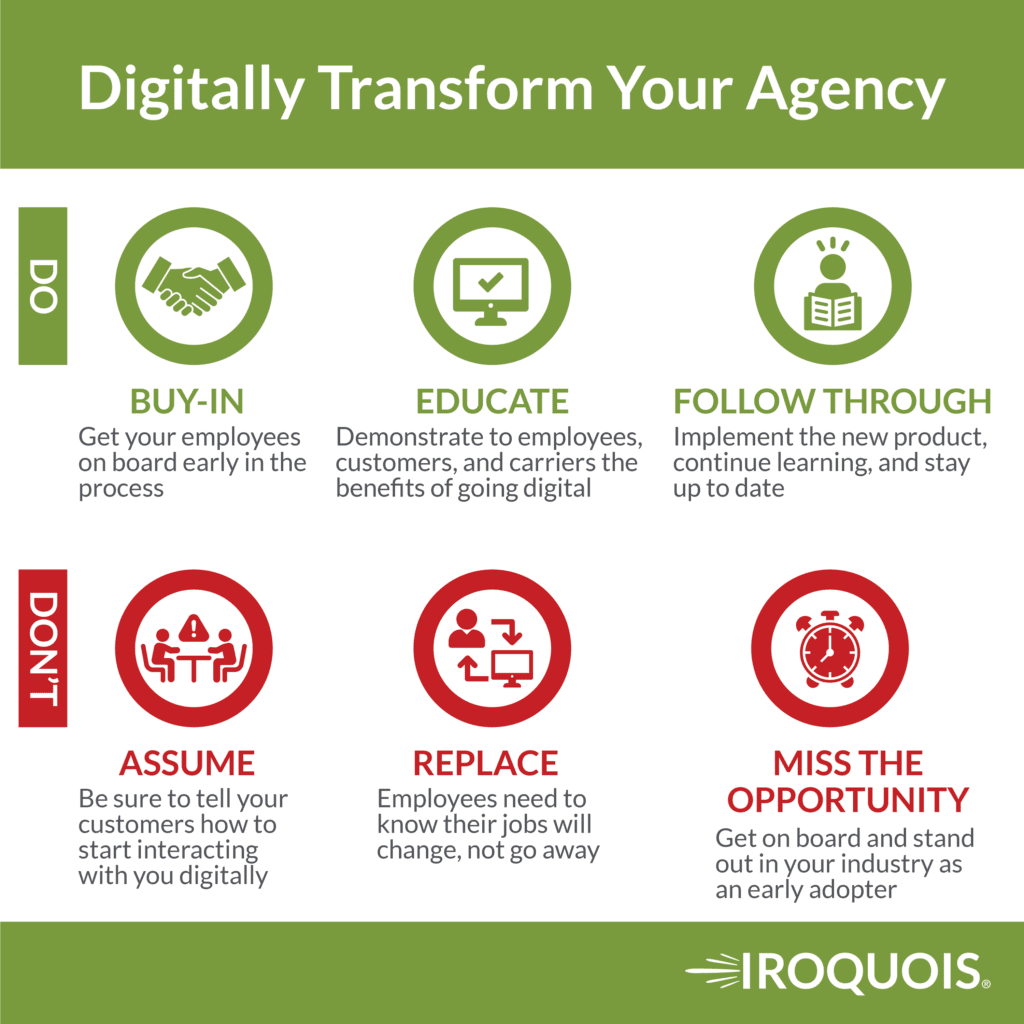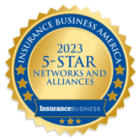Most agencies want to be on the leading edge when it comes to customer service and we’ve been told becoming a digital agency is a great way to do that. But just what does that mean? Join the Trusted Advisor as we chat with Steve Refitt, who walks us through what a digital agency looks like. He also addresses the biggest challenges an agency typically faces in the transition process and gives us some tips on how to get past them. Through examples like Blockbuster vs Netflix and Taxis vs Uber, Steve helps listeners understand that this change is approachable and necessary. Take the first step by listening to this episode of the Trusted Advisor Podcast. Check out Applied’s other offerings here.
Edwin K. Morris (4s):
Welcome to the trusted advisor podcast brought to you by Iroquois group. Iroquois is your trusted advisor in all things insurance. I am Edwin K. Morris. Let’s welcome, Steve Refitt. He is the Alliance partner manager for applied systems incorporated. He oversees the strategic network and cluster partnerships within the applied systems partner program. Prior to applied systems, Steve was a director of sales and acquisition for a $30 million agency operation in Columbus, Ohio. He also worked eight years on the carrier side of the business, both with Mapfre insurance and farmers insurance. In the essence of what a digital agency is, what are the core issues or competencies?
Steve Refitt (49s):
Great question, obviously. And so I think we could take a step back on that too, and say, what is a digital agency and simply put, for an independent agency, it’s being able to touch your consumers from a digital standpoint. And sometimes that gets confusing in the marketplace in terms of what does that mean, but really, it just means we need to deliver to our consumers the way they want to communicate with us as agencies. So whether that’s mobile apps or they want online access to their policies, and we, we at Applied view it as if you’re a digital agency, a full form digital agency, you’re able, your agency is able to communicate with the carriers, your insurance carriers that you’re soliciting for and selling business for in a digital form.
Steve Refitt (1m 31s):
And then also you’re able to communicate with your consumers in a digital form. So again, that could be to the carrier side, it’s, you know, it’s a really Ivan’s play in terms of there’s a lot of tools that Ivan’s has that allows transmission of data from your carriers to you. That makes it digital. And then obviously to the consumer, is a mobile app, a client service portal, things along those lines that allow you to communicate in a digital way
Edwin K. Morris (1m 52s):
So you’re building a capacity or you’re working within a capacity that is an expected capacity by most consumers at this point in time.
Steve Refitt (1m 60s):
Oh yeah. A hundred percent. I think we would all agree. We’re probably the exact same probably become, you know, headline readers at this point, because information comes in so fast.
Edwin K. Morris (2m 8s):
What’s the biggest challenge in delivering that level of service?
Steve Refitt (2m 11s):
It’s a great question. I think, you know, for the agency, it’s a matter of commitment. You know, the products are out there. I mean, applied just quick glance is, you know, we have the products available, available to deliver on those capacities. We have the products that are available to communicate with the insured in just about any form that you want. But in reality, it just comes down to, I think agencies need guidance. They need to know which direction to go. We can obviously help them with that, but there’s consultants that can help with that as well. The ultimate challenge is the products are there, but the agencies just gotta, they gotta, they gotta push the button to make the decision, you know, to become digital and get themselves prepared for the digital age. Right?
Edwin K. Morris (2m 51s):
Because as an operation, you have to make a conscious decision in a, in a tactical strategic way that we’ve gone from the nine to five model of 40 years ago. And now we’re just going to be, you know, you have to work with a consumer at the expectation they expect, or you’re going to lose them.
Steve Refitt (3m 7s):
No, a hundred percent, Edwin. I would use the, you know, my buddies say, you know, some of them are business owners and like, well, I don’t have a boss. Well, actually you have more bosses than I do. You’ve got, you know, 3000 customers and they’ve become your boss. So you’ve got to find a way to deliver on their expectations.
Edwin K. Morris (3m 24s):
So what would be your advice to someone that is not in the digital footprint yet, but they, they need to, they, they understand that there’s a need. They just don’t know where to start.
Steve Refitt (3m 33s):
Yeah. I think the big push right now, and you’ll see a lot of them out there, are consultants. Consultants that specialize in digital agencies and what to do. That’s, that’s a step you can take. Obviously there’s usually a cost to that, but you can also reach out to a company like Applied, who will walk you through the products and what’s available and the cost structure and what the return on investment, which is the most important thing, right? What, what, what money am I going to get back if I make these decisions? And so it’s just really taking the step to sit down and say, Hey, I want to make this decision to become digital. But then furthermore, which I feel like I don’t touch on enough and maybe we don’t as an organization, is that your agency has to be culturally ready for that change.
Steve Refitt (4m 16s):
That change is coming. And the preparation of that takes a lot from the service reps to the CEO. They’ve gotta be ready for that change, and it’s not going to be easy necessarily, but it’s, it’s a phenomenal change for the future.
Edwin K. Morris (4m 31s):
It’s a tough nut to crack because it’s not just buying a widget or a process or a product. You’re changing the behavior of everybody in your organization. So is it, how much is tied to education? How much do you have to tie in education and training to change not only the culture, but how they address the customer?
Steve Refitt (4m 49s):
And so, you know, you look at any vendor across our space, our agency management system space. And you’ll see, I mean, when you buy a product there’s education tied to it, right. It has to happen because they’re so complex. And I think it all gets convoluted because there are so many products out there. And so again, it just goes back to expect education, be prepared for education. When you finally get your agency, your organization ready to make the decision, mentally prepare that you have to learn how to use this, because we’d be the first to tell you that a percentage of the clients that we may lose, I can safely say that it’s because they didn’t take the time to educate themselves on a product or really dive into the training to understand that.
Steve Refitt (5m 30s):
And then those that really did are our long time great customers. So it is a piece just, just buy in all around that from top to bottom, the product change and the, and the education piece,
Edwin K. Morris (5m 42s):
Are there a set of core characteristics of what a digital business is?
Steve Refitt (5m 47s):
So we, we, we try to break it down for agencies so they can see what a digital agency is really helping the agency do. You know, you’re, you’re, you’re getting growth. Once you become digital, you will see ROI immediately from just your apps and service portals. Those things really allow you to run more efficiently and do the sales things. If you or I Edwin, if we, as a consumer, have the ability to communicate with the portal instead of calling the agency, that frees up time for that person that I would have called to go sell a policy and make more money for themselves. It builds trust, you know, the cloud-based systems that they have now everything’s secure data secure. So you don’t have to worry about that.
Steve Refitt (6m 26s):
And then ultimately it leads to customer satisfaction. So if I were to give you the five core characteristics, you’ve got growth, you’ve got efficiency. You know, you build trust in your clients because of the safety of their information. And then ultimately the customer satisfaction really rounds out everything because you’re able to provide the advice, the time for the advice, you’re able to generate more revenue. It helps in a multitude of things. And we really, you know, if we had more time, we’re able to break those down and show you how a digital agency does that.
Edwin K. Morris (6m 57s):
The only thing I’m not hearing, and it sounds apparent to me, is innovation. You have to stay not only with the marketplace and the business, but the customer experience, because that’s constantly going to shift and change. And that leads your operation I would think.
Steve Refitt (7m 14s):
Yeah, a hundred percent. We like to talk about there’s two industries that I wouldn’t call it a scare tactic because you know, we lived it and we breathed it. But look at taxis, right? What did Uber and Lyft do? They found a way to deliver to the consumer the way the consumer wanted to respond and buy something. Taxis are down and out. Medallions are, you know, in New York used to sell for 1.1 million, are selling for 180,000 now. And then the big one is Netflix and blockbuster. Blockbuster had a chance to buy Netflix. They said, no. What happened? They went down, Netflix went up. And so it’s just the conscious decision to say, I have to do this.
Steve Refitt (7m 53s):
Or your results may vary in terms of your future success.
Edwin K. Morris (7m 59s):
The thing is, is that, like you say, this disruption, those disruptors that can see the marketplace that is and say, well, everybody’s tired of dealing it that way. Just like in the taxi situation, that totally flipped the whole idea. Right. I mean, it really did. It empowered the consumer and that’s the key. Yeah, absolutely.
Steve Refitt (8m 18s):
Yeah. We, we, we touched on that a decent amount. So it’s two prime examples that are well-known and you look at banks, I’ll just add to that. If you don’t mind, Edwin, I mean, banks easily could have been taken over by online banks, but they made the move fast enough and early enough to where they stayed relevant with this digital footprint of online banking and things along those lines where they, they’re not having the issue that maybe some insurance agencies may have if they’re not in that digital realm.
Edwin K. Morris (8m 47s):
Can give you an example of a disruptor in that industry called USAA. So as a, as an old military guy, I’m still with USAA because they just keep innovating and adding on, they started with insurance, but now they are everything and they don’t have a physical footprint. And also it’s opposite. It really is a key ingredient. I think, to see that innovation happen. And that to me is a, is a true driver of change, is trying to stay ahead of that.
Steve Refitt (9m 13s):
Yeah. A hundred percent. And you know, it’s first off, Edwin, I appreciate your service. I’m a big military guy. I was not one, but I do appreciate it. It comes down to making the decision, because if you look around you, the people that the news is talking about, or whatever, whatever you see, somebody is doing something digitally to make themselves money, right? I mean, you can go as far as the YouTuber can become a millionaire in six months, you know? I mean, it’s just crazy.
Edwin K. Morris (9m 42s):
Everything’s an opportunity, right? It’s a, it’s a low threshold really. I mean, it’s a low threshold to do anything digitally versus, you know, building and construction and all those other things. I mean, it’s a very simple way to get in. As an agency, though, once they throw that switch, that’s it, you know, it’s not, it’s not like, Oh, we’re just going to do this one thing and we’re not going to buy SharePoint. We’re not going to buy a Microsoft product and everything it changes. It’s we have to change also. And it’s not going to be, I mean, it’s a, it’s a continual it’s, we’re going to switch and we’re going to keep going that way because we’re not getting off the train until a new train shows up.
Steve Refitt (10m 18s):
Yeah. Okay. A hundred percent. I would agree. And it is going back to the points you made, you know, when you make that switch and you make that change, you, you touched on it. I think where you were headed was there’s so much more to it, right? I mean, I think we could reemphasize this point over and over again, that yes, I bought the product now I’m digital. Well now you have to let your insureds know. Right. And now you have to use the system to let them know it exists. And so it’s, it’s, there’s so many steps to that process to truly maximize it. You know, we have a lot of customers, they use our CSR 24 platform, which is literally an extension of the agency management system that allows you as the consumer to either use the mobile app or get online to access your policy docs or your ID cards or whatever.
Steve Refitt (11m 1s):
If you, as an insured, don’t know that me, ABC agency, has that, it never gets used.
Edwin K. Morris (11m 8s):
There’s no value right there. Yeah, absolutely. Well, thank you. Fabulous conversation. I hope to have you back on again, because I think we’ve got many other topics.
Steve Refitt (11m 19s):
Yeah, no, I appreciate it. Thank you all, Kelsey and Edwin, both.
Edwin K. Morris (11m 23s):
Thanks for listening to this edition of the trusted advisor podcast brought to you by Iroquois group. Iroquois, your trusted advisor for all things insurance, and remember get out of the office and sell. This program was recorded live at the Cohen multimedia studio on the grounds of Chautauqua institution. I am Edwin K. Morris, and I invite you to join me for the next edition of the trusted advisor podcast.



